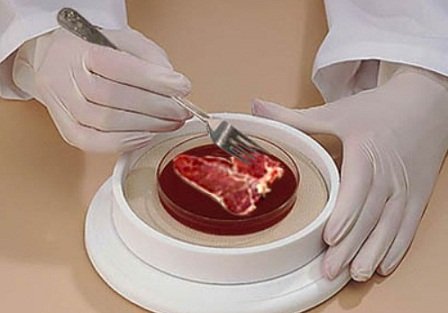Frankenburger: World’s first lab-grown burger to be unveiled in London
Frankenburger, the world’s first lab-grown burger, is to be unveiled and eaten at a news conference in London on Monday.
Scientists took cells from a cow and, at an institute in the Netherlands, turned them into strips of muscle which they combined to make a patty.
Researchers say the technology could be a sustainable way of meeting what they say is a growing demand for meat.
Critics say that eating less meat would be an easier way to tackle predicted food shortages.
Professor Mark Post of Maastricht University, the scientist behind the burger, said: “Later today we are going to present the world’s first hamburger made in a lab from cells. We are doing that because livestock production is not good for the environment, it is not going to meet demand for the world and it is not good for animals.”
But Prof. Tara Garnett, head of the Food Policy Research Network at Oxford University, said decision-makers needed to look beyond technological solutions.
“We have a situation where 1.4 billion people in the world are overweight and obese, and at the same time one billion people worldwide go to bed hungry,” she said.
“That’s just weird and unacceptable. The solutions don’t just lie with producing more food but changing the systems of supply and access and affordability so not just more food but better food gets to the people who need it.”
Stem cells are the body’s “master cells”, the templates from which specialized tissue, such as nerve or skin cells develop.

Frankenburger, the world’s first lab-grown burger, is to be unveiled and eaten at a news conference in London
Most institutes working in this area are trying to grow human tissue for transplantation, to replace worn out or diseased muscle, nerve cells or cartilage.
Mark Post wants to use similar techniques to grow muscle and fat for food.
He starts with stem cells extracted from cow muscle tissue. In the laboratory, these are cultured with nutrients and growth promoting chemicals to help them develop and multiply. Three weeks later, there are more than a million stem cells which are put into smaller dishes where they coalesce into small strips of muscle about a centimetre long and a few millimetres thick.
These strips are collected into small pellets which are frozen. When there are enough, they are defrosted and compacted into a patty just before being cooked.
The scientists have tried to make the meat – which is initially white in color – as authentic as possible. Helen Breewood, who is working with Prof. Mark Post, makes the lab-grown muscle look red by adding the naturally occurring compound myoglobin.
Currently, this is a work in progress. The burger to be revealed on Monday will be colored red with beetroot juice. The researchers have also added breadcrumbs, caramel and saffron, which will add to the taste.
At the moment, scientists can only make small pieces of meat; larger ones would require artificial circulatory systems to distribute nutrients and oxygen.
Prof. Mark Post said initial sampling suggests the burger will not taste great, but he expected it to be “good enough”.
Helen Breewood is a vegetarian because she believes meat production to be waste of resources, but says she would eat lab-grown meat.
“A lot of people consider lab-grown meat repulsive at first. But if they consider what goes into producing normal meat in a slaughter house I think they would also find that repulsive,” she said.
In a statement, animal welfare campaigners People for the Ethical Treatment of Animals (PETA) said: “[Lab-grown meat] will spell the end of lorries full of cows and chickens, abattoirs and factory farming. It will reduce carbon emissions, conserve water and make the food supply safer.”
The latest United Nations Food and Agriculture Organization report on the future of agriculture indicates that most of the predicted growth in demand for meat from China and Brazil has already happened and many Indians are wedded to their largely vegetarian diets for cultural and culinary reasons.
Lab grown meat might turn out to be a technological solution in search of a problem.
[youtube 27PO_nu3BEs]
[youtube VikkBQRtbdk]
